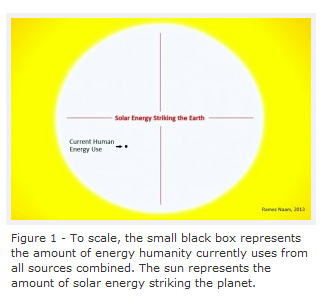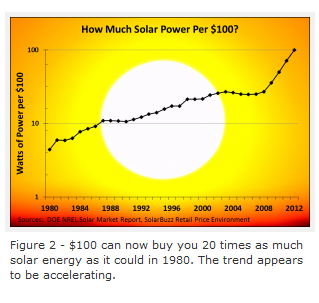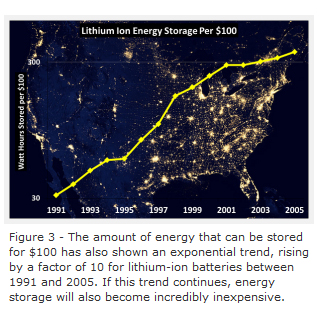 By Ramez Naam
By Ramez Naam
This is Part One of a five-part series by Ramez Naam, Singularity University Adjunct Faculty, exploring the power of innovation to boost our access to energy, food, water, raw materials, and human population. All are based on his new book, The Infinite Resource: The Power of Ideas on a Finite Planet.
We have access to nearly unlimited energy, food, water, and raw materials. Over the next 5 days, I'll demonstrate that with numbers.
This is not to say that we don't have problems or threats ahead. We live on a finite planet with real problems facing it. Over the last few years, the prices of oil, food, metals, and raw materials of all sorts have shot up. Fresh water aquifers and rivers are being drained at a ferocious rate. Carbon dioxide and other greenhouse gases from our use of energy are heating up the planet. Over the next few decades human population will rise by another 2 billion and demand for water, food, and energy will rise by 50%, 70%, and 100%, respectively. Some look at these numbers and conclude that we're headed for a sharp crash, or at least that we're at the limits of the human population and human prosperity that the planet can bear.
But the planetary limits aren't even close. The only real limit, indeed, is the speed with which we can innovate. That is the critical variable to our future prosperity.
Energy
Humanity consumes energy at a rate of roughly 17 Terawatts - that is to say, 17 trillion joules per second, every second of every day. That's a huge number. But the sun hits the planet with nearly 90,000 Terawatts of power - 90 quadrillion joules per second - or more than 5,000 times as much energy as we use from all current sources of energy combined.
So energy on this planet is abundant. The primary problem isn't a limit on the amount of energy we can tap into. It's that we're primarily tapped into the far smaller far dirtier supply of energy from fossil fuels.
Much of that is because solar energy, until recently, has been prohibitively expensive. But that's changed rapidly through exponential improvements in solar photovoltaics. I've written before on the exponentially dropping price of solar power(as have many others). But let's look at this another way. For $100, how much solar power generating capacity can you buy?
The change is stunning. In 1980, $100 would buy you 5 watts of solar generating capacity. At the end of 2012, the same amount of money would buy you 100 watts of solar generating capacity, or 20 times as much.
Solar is now at the price where in sunny areas it is roughly the same price as grid electricity from coal or natural gas. If this pace continues, in the very near future solar will be far cheaper than any other sort of energy, allowing individuals and businesses to tap into many times more energy than they do today, at a lower cost, with no greenhouse gas emissions.
Of course, we also need to store energy for use at night time. That also shows an exponential trend. Looking at just one technology - lithium-ion batteries - we see that the amount of energy that could be stored for $100 went up by a factor of 10 in just 15 years, from 1991 to 2005.
In short, the planet provides us with a tremendous amount of energy - far more than we will need for centuries to come. IF we can maintain - or even accelerate - our pace of innovation in energy technology, we'll be able to tap into this wealth of energy.
The challenge isn't the limit of energy - it's a race between the rate at which we damage our climate and the rate at which we can innovate.
Visit XPRIZE at xprize.org, follow us on Facebook, Twitter and Google+, and get our Newsletter to stay informed.
This material published courtesy of Singularity University.
Our 2024 Coverage Needs You
It's Another Trump-Biden Showdown — And We Need Your Help
The Future Of Democracy Is At Stake
Our 2024 Coverage Needs You
Your Loyalty Means The World To Us
As Americans head to the polls in 2024, the very future of our country is at stake. At HuffPost, we believe that a free press is critical to creating well-informed voters. That's why our journalism is free for everyone, even though other newsrooms retreat behind expensive paywalls.
Our journalists will continue to cover the twists and turns during this historic presidential election. With your help, we'll bring you hard-hitting investigations, well-researched analysis and timely takes you can't find elsewhere. Reporting in this current political climate is a responsibility we do not take lightly, and we thank you for your support.
Contribute as little as $2 to keep our news free for all.
Can't afford to donate? Support HuffPost by creating a free account and log in while you read.
The 2024 election is heating up, and women's rights, health care, voting rights, and the very future of democracy are all at stake. Donald Trump will face Joe Biden in the most consequential vote of our time. And HuffPost will be there, covering every twist and turn. America's future hangs in the balance. Would you consider contributing to support our journalism and keep it free for all during this critical season?
HuffPost believes news should be accessible to everyone, regardless of their ability to pay for it. We rely on readers like you to help fund our work. Any contribution you can make — even as little as $2 — goes directly toward supporting the impactful journalism that we will continue to produce this year. Thank you for being part of our story.
Can't afford to donate? Support HuffPost by creating a free account and log in while you read.
It's official: Donald Trump will face Joe Biden this fall in the presidential election. As we face the most consequential presidential election of our time, HuffPost is committed to bringing you up-to-date, accurate news about the 2024 race. While other outlets have retreated behind paywalls, you can trust our news will stay free.
But we can't do it without your help. Reader funding is one of the key ways we support our newsroom. Would you consider making a donation to help fund our news during this critical time? Your contributions are vital to supporting a free press.
Contribute as little as $2 to keep our journalism free and accessible to all.
Can't afford to donate? Support HuffPost by creating a free account and log in while you read.
As Americans head to the polls in 2024, the very future of our country is at stake. At HuffPost, we believe that a free press is critical to creating well-informed voters. That's why our journalism is free for everyone, even though other newsrooms retreat behind expensive paywalls.
Our journalists will continue to cover the twists and turns during this historic presidential election. With your help, we'll bring you hard-hitting investigations, well-researched analysis and timely takes you can't find elsewhere. Reporting in this current political climate is a responsibility we do not take lightly, and we thank you for your support.
Contribute as little as $2 to keep our news free for all.
Can't afford to donate? Support HuffPost by creating a free account and log in while you read.
Dear HuffPost Reader
Thank you for your past contribution to HuffPost. We are sincerely grateful for readers like you who help us ensure that we can keep our journalism free for everyone.
The stakes are high this year, and our 2024 coverage could use continued support. Would you consider becoming a regular HuffPost contributor?
Dear HuffPost Reader
Thank you for your past contribution to HuffPost. We are sincerely grateful for readers like you who help us ensure that we can keep our journalism free for everyone.
The stakes are high this year, and our 2024 coverage could use continued support. If circumstances have changed since you last contributed, we hope you'll consider contributing to HuffPost once more.
Already contributed? Log in to hide these messages.
 By Ramez Naam
By Ramez Naam

